- Home
- Brian Spangler
Fallen: Post-Apocalyptic Dystopian Thriller - Book 1 (Caustic) Page 4
Fallen: Post-Apocalyptic Dystopian Thriller - Book 1 (Caustic) Read online
Page 4
The last mile was a near blur. Emotion, and pain had started to take hold. Emily followed the blue line until she hit a parked car, bouncing off of it. But unlike the car that had crashed into them, she’d gone slow enough that she could back away and continue on.
Emily bumped into another parked car and then a third. From the backseat, Justin became livelier, laughing at the comical way his body bumped around.
“Daddy never does that,” he said. “Again, again, again!”
“Not now. Not on purpose, anyway.” Her words sounded slurred and her mind felt foggy. “Got all your plastic on?”
“Uh-huh,” he answered. “But I don’t know how to make eyeballs.”
“Push a finger through the plastic.” She heard the thin sound of plastic stretching and popping. The car hit something again. But it wasn’t another parked car. They’d hit the concrete curb separating the asphalt from the mall’s entrance. They’d made it. All at once, Emily thought she was going to begin crying.
“A hundred steps,” she said aloud. “A hundred steps to the doors.” A small fact she’d learned only because she and her girlfriends had counted them out one afternoon after they’d grown bored. She stopped then and thought maybe she could drive over the curb—drive up to the doors. The bollards, she remembered. Stumpy concrete legs sprouting up through the pavement like guardian statues. They’d been installed after the last hurricane, keeping the cars off the sidewalk. She couldn’t see them, but they were there.
“Are you ready, Justin?”
“I’m ready,” he answered. “But where is your costume?” Emily grabbed the plastic bags and stretched one over her left arm, grimacing when pain knifed her side. She sleeved her other arm and punched a hole for her hand. Her thoughts stalled then and the inside of the car was suddenly turning over. And for a long moment she couldn’t remember why they were at the mall. Dizzy, she cradled her head and wanted to cry. Their time was short.
“Emily?” she heard distantly. “Let’s go, Emily. I wanna see Dad.”
“The water,” she slurred. “Cover your head with the plastic, we’re going.” Opening a bottle, she dumped it over her head, pushing down her hair. The cold water woke her up. Her long red tresses fell flat against her face.
Soon her feet were outside and the salty fog captured her lungs. The condensation on the car’s handle burned instantly. She ignored it, opened Justin’s door, and sucked in the car’s air.
“Take a deep breath, and hold it as long as you can.”
“Hold it?”
“Try holding your breath, okay? On three.”
“On three? But I’m scared.”
“I am too. Dad will be in there.”
Justin reached up, clutching his sister’s neck.
“One… two… three!”
Emily began counting as she walked toward the mall’s tall glass doors. This was one walk she could do with her eyes shut. A straight shot. One hundred steps from the curb to the doors—eyes open or closed.
By the twentieth step, the air had leached through her wet hair, but she pushed forward, stretching her gait. Tears were streaming down her face as her eyes tried desperately to wash the poison burning them. Justin’s hands were loosening, falling away from her.
“Hold on,” she coughed, hearing raspy mucous rattle deep in her throat. By the sixtieth step, the wooziness weighing on her head was more of a threat than the poisonous fog. The strength in her legs was failing, and her feet became heavy. She gripped her brother, and Justin wrapped his arms and legs tighter, complaining in her ear that it hurt to breathe. And before she could answer him, a flash of lightning filled her eyes. They’d crashed into the tall glass doors, bouncing backward.
A sudden warmth spread over her middle and dripped down her arms. It was liquid and runny, going cold almost at once. The heavy flow continued and she thought that she’d started bleeding, or maybe Justin was bleeding.
“I’m sorry,” Justin cried, squirming. He’d peed, and she thought that the fog burns on her arm oddly felt a little better.
“It’s okay, buddy. We’re here, anyway,” she croaked, hugging his little body as he shook from the wet cold.
Emily grabbed the long metal handle, the touch burning her skin, and rushed them inside. Justin pulled off his plastic bag, grabbing at the back of his head. His face was swollen and red, burned. Emily wondered how bad she must look; how badly she’d been burned. She darted her eyes around the inside of the mall, finding dozens of faces staring back at them. Some familiar, some not. But all of them wearing the same expression—the same one she’d often seen on television after a disaster.
“Emily!” a woman’s voice called out. Ms. Parks, her ninth-grade English teacher, ran toward them. “Honey, you two are burned. Come on, we set up some help in the food court.” Emily set Justin down and fell to her knees, vomiting. Pools of red splashed onto the large brown tiles.
“We were in a car accident,” she was able to say before another wave of nausea hit her. She wiped her mouth with the back of her hand, searched the empty faces. Her father wasn’t there. “My father?”
“Phone!” Justin said. Her phone was buzzing. It wasn’t just a text message. It was actually ringing. A call was coming through. She scrambled to answer it.
“Hello?”
“Emily, baby?”
“Daddy!” she nearly screamed. “We made it, Daddy! We made it to the mall.” The faces around them grew dim, and her father’s voice began to break up. More people offered to help her to her feet. She waved them off, intent on listening.
“Justin, and your mom?” he asked. “I can’t reach your mom’s phone!” Emily bit her lip. An image of her mother’s face came into her mind. She couldn’t bring herself to tell him what had happened.
“Justin is here with me,” she said, beginning to blubber. A babble of unintelligible words came next. “You can see us when you get here!”
“Emily, I’m so sorry,” he told her, his voice going in and out. “I’m so sorry this happened. It was all my fault. All of it.” She held the phone away from her head, trying to understand what he was saying.
“But the fog was an accident. Right, Daddy?” A moment of confusion and doubt snapped at her heart.
“I love you guys. Remember that, okay?” Her father’s voice went quiet then. She could hear him crying. And in the background, she could hear something else. It was the sound of a car horn. A horn that was stuck, blaring, and immediately her heart went still. Her arms and legs tingled, and she struggled to breathe.
“Daddy, what’s that sound?” she was able to ask before the first sobs set in. “Daddy… Dad, where are you?”
“Baby, I love you. But I’m not going to make it to the mall.” The car horn’s wail mixed with her father’s words. Visions of curious faces began to spin around her.
“Why?” she yelled at him. “Why aren’t you coming?”
“I hit something. It’s bad, baby. Got me trapped inside. I love you guys—”
The phone cut out a final time.
The view in front of her turned over, and she heaved. She was vaguely aware of being lifted, her breathing painful. She was succumbing to the damage from the caustic air. The faces that had stared were now carrying her, saving the daughter of the man who’d released a poison monster upon the world. Comfort came when she heard Justin’s voice, encouraging her to stay awake, like she’d done with him earlier. Her arm fell, and she felt his tiny warm fingers wrap around hers, tugging on them.
“Dad will be here soon,” he told her. “Daddy will be coming, just like you said, Emily.” And in that moment, she decided to never tell anyone what her father had done. She’d never say a word about the catastrophe he’d caused. Instead, the story she’d tell would be about the tragedy of two lovers, dying together, yet separated by a disaster. And she’d tell of the great accident, and how a young brother and sister fought and survived the day when the skies first went gray.
5
Her last memory was the taste o
f blood: copper, like a penny. But there was more in that memory, wasn’t there? The warm touch of her little brother’s fingers. His voice chirping in her ear like a sparrow calling from their yard. And there was a sense of being lifted—carried like a leaf in the breeze. Pain. There had also been a terrible pain. And the sound of hissing static after hearing her father’s last words.
Emily licked her lips.
The taste of damp salty air.
She wasn’t in her memory anymore.
In real-life, the dead aren’t at all like you see in the movies. On the silver screen, they are crumpled and broken, flying like rag dolls through the air. Or their limbs are stretched awkwardly, making blood angels on the black-top and pavement. But sometimes, the dead are made up like porcelain figurines, cleaned and pristine, hair combed back flat with their faces painted to look forever calm. That isn’t at all what Emily saw when she first opened her eyes. Cordwood was the closest thing she could think of. Stacked cordwood.
Emily peered ahead, staring at a dead body. It just laid there. No sound. No movement. No memories to get lost in. Dead. She told herself to turn away, but couldn’t. It was the first time she’d ever seen a dead body—up close, anyway. Yet there were countless dead all around them now. Her father, her mother, just to name a few. But the fog kept them hidden like a dirty secret. A thousand secrets? A million? She cringed. They’d all died from the poison promise that her father released upon the world. I survived though… I survived, and so did Justin.
Blink, she insisted. Blink and take the image away. The dead man was older, his silver hair revealing a few youthful streaks of color. His front was soiled with sweat stains and blood that had dried stiff. She wondered how long he’d lived. How long after he’d reached the safety of the mall? And, she thought, how awful it was for him to have made it this far, only to die.
Emily eased back to sleep, curling her knees up to her chest, telling herself that she was back in her bedroom—that is, before her world imploded. But a stir of activity kept her close to the edge, pulling on her like a wave. And when she fell deeper, letting go, she saw Justin with her father and mother, and heard their voices. A garden of fond memories was hers to pick from.
Noise.
She narrowed one eye open, only to find the dead man watching: guarding.
Drifting.
A thump against the car door. Her breath is gone—she doesn’t want to see the memory.
Nightmare.
Her mother’s hand, crawling across the glass.
On the car window, a bloody stain in the shape of a heart—the word GO scrawled beneath it.
A scatter of pots and pans crashed to the floor, jarring her.
Sleep would have to wait—no matter how badly her body needed it to heal, it would have to wait. Her companion agreed; that’s what she imagined he’d say if he could.
There was something familiar about his dead eyes. Baby blues that she remembered from a lifetime ago. Like the fallen clouds, they had gone pale, gray and lifeless. But still, she knew them. And in her past, they’d been like a summer sky, bright and inviting, greeting her every school morning. Mr. Rainer was her school’s vice-principal, but now he was just cordwood. Another dead body.
Much of his face had been burned by the fog. And while his eyes had begun to sink into his head, they’d remained open in a morbid gray stare; a reminder of what had killed him. And there was the smell. Thick and sickening, his clothes held onto the poison like a heavy bleach. She could have retched from the odor, but was able to breathe past it, tolerating it. But even beneath the chemical, there was something else lingering: the sallow smell of death.
Mr. Rainer’s feet were bare, and she wondered where his shoes had gone. Emily made fists with her toes, assuring herself that she could still feel her shoes. She never understood why hospitals removed a person’s shoes, leaving their feet exposed: naked. The tag? Maybe it is for the toe-tag. Not that this was a hospital, but with the tables stacked, and the dead and injured on top of them, it was beginning to resemble one.
“I’m sorry Mr. Rainer,” she whispered. Her voice was scratchy and dry, cracking between her words. “I’m sorry for whatever it is my father did.”
She took care to make sure nobody was around to hear her. A heaviness settled in her heart. It was different—sorrowful. She knew at once that it was guilt. Guilt for who her father was, and for what he’d done. What path lay ahead for her? For Justin? She hoped that her brother was too young to understand the burden they would carry; she could hope for that at least.
She groaned, pressing her side. Broken ribs for sure. Emily turned to face her guilt. She half expected a reply from Mr. Rainer. A short nod, or blink maybe. None of that happened. The dead don’t move.
Why doesn’t someone cover him up? But they weren’t in a hospital. Cover him up with what? Like the missing toe-tag, there were no gurneys or blankets. This was a food court—the one she’d spent her Friday and Saturday nights at—where she’d spent countless perfect, happy evenings with friends, talking about nothing, doing everything, growing up, living.
Emily winced against the pounding in her skull and the rushing sound of blood in her ears. She squeezed her eyes, trying to focus past the doubled images, trying to make sense of the new food court.
As expected, the shops were closed. The Subway shop and the Pizza Shop looked orphaned in the pale light. She imagined a few friendly faces beneath uniformed caps, standing behind the counters, smiling at her. Emily blinked the image away. The Starbucks and Dairy Queen were empty too. No lines, or wandering teens, debating fraps vs. blizzards. The emptiness was eerie. But it was the utter silence that was what she found the most disturbing.
The tables had been cobbled together, turning them into makeshift beds, back to front, row after row, looking like a giant chessboard. The kind where the dead played, she supposed. Silvery arms beamed down from the skylights, drawing faint paths in front of her. And along the walls, glassy eyes sprouted in pairs, soft yellow orbs throwing a glimpse into the darker corners. Across the court, in the furthest corner, she could make out the red letters of an emergency exit sign. A barricade of chairs and tables were perched up high in front of the door, guarding anyone against accidentally going outside.
Her hopes lifted, seeking out the round lights on the walls, and taking comfort in them being on. If there was power, then there might be a phone. The pots and pans she’d heard earlier rattled, scraping against the ground. Food. A stir in her stomach. She was hungry.
“Thought you were dead,” a voice interrupted. A young man walked around and pulled on Mr. Rainer’s shoulders. “Good thing I saw you moving.”
With broad shoulders, he carried a mess of sandy brown hair—his blond highlights catching the gray light as he moved. Next to her fair complexion, his skin was tanned: attractive. A lifeguard maybe, and her thoughts went to the beach and a memory of hot sand beneath her feet. And then she thought of pools and sleeping in lounge chairs and the smell of chlorine and breathing in the faint scent of suntan lotion.
From above a patch of tidy freckles, his green eyes quickly looked her up and down. A sudden shyness came over her, and she tucked in her legs bashfully. But in his eyes she saw a gentleness and concern. He wasn’t ogling her at all. Instead, he was just making sure that she was okay.
Beneath his strong features, there was a beautiful boy that she knew once. A flicker of sentiment sprang to life inside her, an attractive notion. While it had been a few years since she’d last seen him, she’d heard something familiar in his voice. Peter Wilkes was in his final year of high school when she’d just started her first… that also happened to be the year that she’d begun to notice boys. And buried somewhere beneath the rubble of her house—tucked in between her mattress and the box-spring—she’d hidden away a black and white copybook. And inside the jacket of that copybook was a single heart shape, penned in purple, circling the name Peter Wilkes.
“You are alive?” he asked, waiting for her
to say something.
“I’m alive,” she coughed, and tried to wet her throat to soften the sound of her voice.
“Emily?” Her ears perked up when she heard her name.
“Peter Wilkes,” she answered.
“Ms. Parks asked me to check on you… just wanted to make sure you were Emily.” His reply soured her earlier sentiment. “Wait. How did you know my name?”
“High school,” she confessed. “Do you know if my brother is okay?” Her throat burned, adding fire to each word.
“Justin?” he asked. She raised her chin. “He’s a good little dude. Grouped him up to play with some of the other kids. He’s pretty shaken up and all, but I suppose everyone is.”
An image of Justin’s face came into her mind. The one when she’d begged him to shut his eyes—demanded that he shut his eyes, and not look at their mother. Emily suddenly felt like crying, but she pushed the emotion back, hardening herself, deciding that she was done.
“Where are you taking him?” she asked, motioning to Mr. Rainer.
“Rainer?” Peter pulled up again on the man’s shoulders, a rapid pop-pop-pop rang out, catching her off-guard. “We’ve got a spot in the back where we’re putting them.”
“Them?”
“The ones that didn’t make it.”
She only nodded and tried to sit up. But understanding what he meant hit her like a punch. She was dizzy and suddenly leaned toward the floor, falling.
“Whoa!” Peter raced around the table, taking hold of her shoulders. His hands were gentle yet strong. “Maybe you should lie back down?”
Shaking her head, she tried to straighten herself, but the dizziness wouldn’t pass. Before she could stop it, vomit spilled between them.
Oh my God, I just threw-up on Peter Wilkes. Another wave came and she retched again. The embarrassment shrank away as she heaved, and pain knifed her side. The smell of vomit quickly rose up, masking the air’s salty stench. I can’t believe that just happened.
The watery sight in front of her was a puddle of vomit and blood, her long red locks hanging down. Peter did something then that surprised her. He pulled her hair back, tucking it safely behind her head. She thought that his gesture was sweet.

 Affair with Murder The Complete Box Set
Affair with Murder The Complete Box Set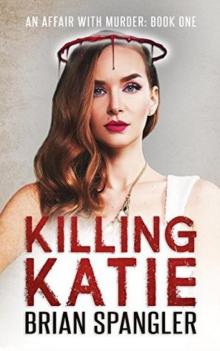 Killing Katie
Killing Katie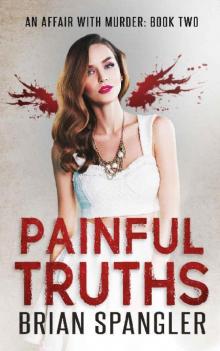 Painful Truths
Painful Truths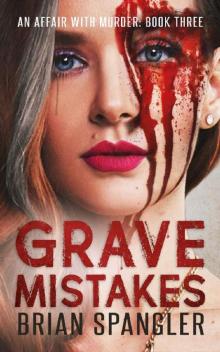 Grave Mistakes_A Deadly Vigilante Crime Thriller
Grave Mistakes_A Deadly Vigilante Crime Thriller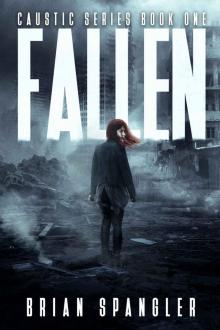 Fallen: Post-Apocalyptic Dystopian Thriller - Book 1 (Caustic)
Fallen: Post-Apocalyptic Dystopian Thriller - Book 1 (Caustic)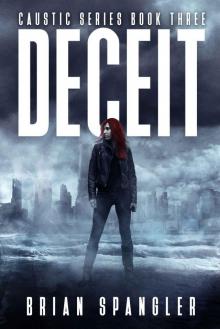 Deceit: Post-Apocalyptic Dystopian Thriller - Book 3 (Caustic)
Deceit: Post-Apocalyptic Dystopian Thriller - Book 3 (Caustic)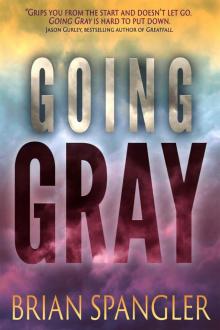 Going Gray
Going Gray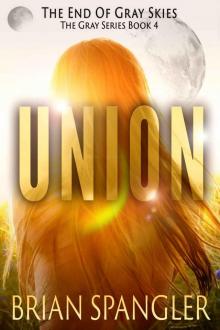 Union
Union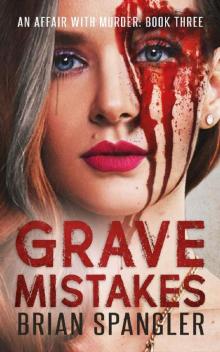 Grave Mistakes: A Deadly Vigilante Crime Thriller (Affair with Murder Book 3)
Grave Mistakes: A Deadly Vigilante Crime Thriller (Affair with Murder Book 3)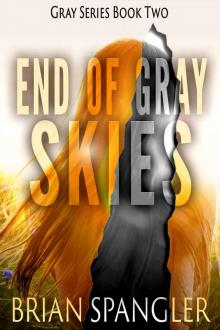 End of Gray Skies: An Apocalyptic Thriller
End of Gray Skies: An Apocalyptic Thriller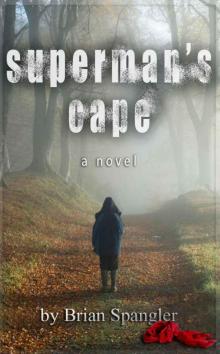 Superman's Cape
Superman's Cape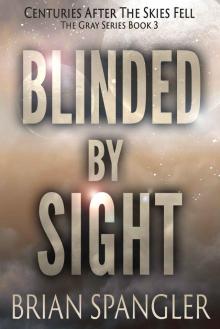 Blinded By Sight (Gray Series Book 3)
Blinded By Sight (Gray Series Book 3)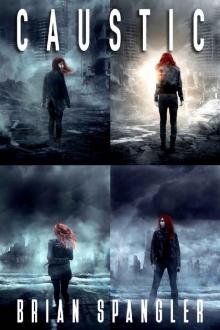 The Complete Four-Book Box Set
The Complete Four-Book Box Set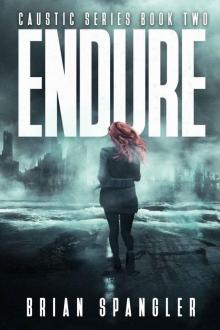 Endure: Post-Apocalyptic Dystopian Thriller - Book 2 (Caustic)
Endure: Post-Apocalyptic Dystopian Thriller - Book 2 (Caustic)